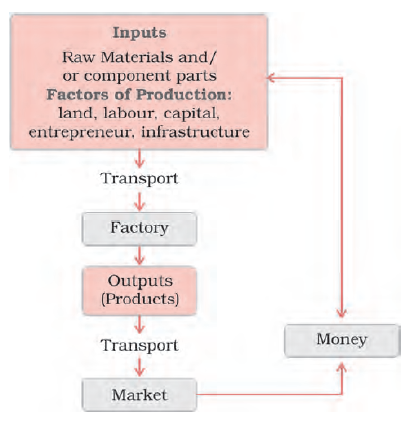The manufacturing industries convert raw materials into finished goods. This industry makes use of machinery or labour to manufacture finished goods. The economic might of a nation is measured by the development of manufacturing industries. This article will provide an overview of manufacturing industries.
Manufacturing Industries – Location
The location of manufacturing industries is dependent on various factors. The location of manufacturing industries is dependent on the availability of suitable land at the desired price, proximity to the market, and availability of adequate labour, power, and capital. Good connectivity through roadways, railways, etc. is also another important factor.
Manufacturing Industries Clusters in India
The manufacturing industries clusters in India are located in the states of Karnataka, Maharashtra, Tamil Nadu, Andhra Pradesh, Gujarat, Telangana, and Uttar Pradesh.
There are different manufacturing associations in India. Some of them are the Indian Specialty Chemical Manufacturers’ Association, Alkali Manufacturers Association of India, Indian Chemical Council, Telecom Equipment Manufacturers Association (TEMA), and Electronics Industries Association of India (ELCINA).
Importance of Manufacturing
The manufacturing sector is considered the backbone of development due to the following reasons.
- Manufacturing industries help in modernising agriculture as it provides jobs in secondary and tertiary sectors.
- It helps in the eradication of unemployment and poverty.
- Export of manufactured goods expands trade and commerce and brings in much-needed foreign exchange.
- It helps in prospering the country by giving a boost to the economy.
Contribution of Industry to National Economy
The trend of growth rate in manufacturing over the last decade has been around 7 percent per annum.
Industrial Location
Industrial locations are influenced by the availability of:
- Raw material
- Labour
- Capital
- Power
- Market
- Government policies
Manufacturing activity tends to locate at the most appropriate place where all the factors of industrial location are either available or can be arranged at a lower cost. The figure below shows the industry market linkage.

Different Types of Manufacturing Industries
Agro-Based Industries
Cotton, jute, silk, woollen textiles, sugar and edible oil, etc. industries are based on agricultural raw materials. Let’s know about each of them, one by one.
Textile Industry
It is the only industry in India which is self-reliant and complete in the value chain, i.e., from raw materials to the highest value-added products. It contributes to industrial production, employment generation and foreign exchange earnings.
Cotton Textiles
This industry has close links with agriculture and provides a living to farmers, cotton boll pluckers and workers engaged in ginning, spinning, weaving, dyeing, designing, packaging, tailoring and sewing. It supports many other industries, such as chemicals and dyes, packaging materials and engineering works.
Jute Textiles
India is the largest producer of raw jute and jute goods. Most of the mills are located in West Bengal, mainly along the banks of the Hugli River.
Sugar Industry
India stands second as a world producer of sugar but occupies first place in the production of Gur and Khandsari. This industry is seasonal in nature.
Mineral-Based Industries
Industries that use minerals and metals as raw materials are called mineral-based industries. Let’s discuss some industries that fall under this category.
Iron and Steel Industry
Iron and steel is the basic industry as all the other industries – heavy, medium and light, depend on it for their machinery. It is considered a heavy industry because all the raw materials, as well as finished goods, are heavy and bulky entailing high transportation costs.
India is an important iron and steel producing country in the world, yet, we are not able to perform to our full potential largely due to the following reasons.
- High costs and limited availability of coking coal
- Lower productivity of labour
- Irregular supply of energy
- Poor infrastructure
Aluminium Smelting
Aluminium Smelting is the second most important metallurgical industry in India. It is used to manufacture aircraft, utensils and wires. Bauxite is the raw material used in the smelters.
Aluminium smelting has gained popularity as a substitute for steel, copper, zinc and lead in a number of industries. It exhibits the following properties:
- Light in weight
- Resistant to corrosion
- A good conductor of heat
- Malleable
- Becomes strong when it is mixed with other metals
Chemical Industries
The chemical industry comprises both large and small-scale manufacturing units. Rapid
Growth has been recorded in both inorganic and organic sectors.
Inorganic chemicals include sulphuric acid, nitric acid, alkalies, soda ash and caustic soda.
Organic chemicals include petrochemicals, which are used for manufacturing synthetic fibres, synthetic rubber, plastics, dye-stuffs, drugs and pharmaceuticals.
Fertilizer Industry
The fertilizer industries are centred around the production of nitrogenous fertilizers (mainly urea), phosphatic fertilizers and ammonium phosphate (DAP) and complex fertilizers, which have a combination of nitrogen (N), phosphate (P), and potash (K). Gujarat, Tamil Nadu, Uttar Pradesh, Punjab and Kerala contribute towards half of the fertilizer production.
Cement Industry
Cement is essential for construction activities such as building houses, factories, bridges, roads, airports, dams and other commercial establishments. This industry requires bulky and heavy raw materials like limestone, silica and gypsum.
Automobile Industry
This industry deals with the manufacturing of trucks, buses, cars, motorcycles, scooters, three-wheelers and multi-utility vehicles. These industries are located around Delhi, Gurugram, Mumbai, Pune, Chennai, Kolkata, Lucknow, Indore, Hyderabad, Jamshedpur and Bengaluru.
Information Technology and Electronics Industry
The electronics industry covers a wide range of products, from transistor sets to television, telephones, cellular telecom, telephone exchange, radars, computers and other equipment required by the telecommunication industry. This industry has generated employment in India. Bengaluru is known as the electronic capital of India.






0 Comments